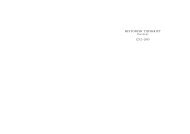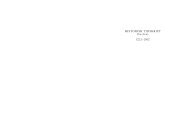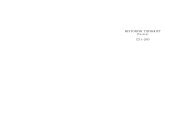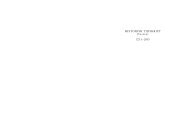Dahlqvist, "Folkhemsbegreppet: Rudolf Kjellén vs ... - Historisk Tidskrift
Dahlqvist, "Folkhemsbegreppet: Rudolf Kjellén vs ... - Historisk Tidskrift
Dahlqvist, "Folkhemsbegreppet: Rudolf Kjellén vs ... - Historisk Tidskrift
Create successful ePaper yourself
Turn your PDF publications into a flip-book with our unique Google optimized e-Paper software.
424 Håkan Arvidsson Dåtiden – tur och retur 425<br />
moderniteten dödar både våra gudar och våra utopier och hotar att lägga<br />
världen öde för människorna. Bara kunskapen om och inlevelsen i det förgångnas<br />
evigt böljande tidvatten kan ge oss förmågan att finna nya och<br />
okända mål att kämpa för och lära oss att skilja på vilka landvinningar som är<br />
värda att slå vakt om och vilka som vi kan och bör offra för att göra världen<br />
bättre. Därför är det mosaikens skönhet och de ögonblickliga aha-upplevelser<br />
den skänker som utgör den humanistiska vetenskapens raison d’etre, dess<br />
berättigande och dess enda möjliga mål. Ytterst sett gäller samma villkor för<br />
all vetenskap och all kunskap. Den enda skillnaden mellan humaniora och de<br />
mera s k ”exakta” vetenskaperna är att historiens olidliga lätthet och det<br />
mänskliga förnuftets begränsningar blir så mycket påtagligare inom den humanistiska<br />
forskningen. I själva verket är alla humanistiska ämnen en balansgång<br />
på slak lina – en balansgång mellan konst och vetenskap. Hitintills har<br />
både historieforskningen och historieskrivningen sett denna balansgång som<br />
en svaghet – ett slags vetenskaplig omogenhet som man värjt sig mot. Vad jag<br />
velat plädera för i denna text är att balansgången om den medvetet och systematiskt<br />
utnyttjar perspektivförskjutningen mellan Då och Nu mycket väl<br />
kan förvandlas till en styrka och bli en väg till djupare förståelse såväl av det<br />
förgångnas förlorade världar som ett sätt att övervinna samtidens förrädiska<br />
självtillräcklighet. I bästa fall kan en sådan historiesyn kanske också hjälpa<br />
oss att projicera en bild av framtiden. Både den framtid vi vill ha och den vi<br />
vill undvika.<br />
Summary: Return Ticket to the Past<br />
All history is a dialog between the present and the past, between now and then.<br />
The difficult task of an historian is to play both roles in this dialog. He has to<br />
both formulate the questions of the present and find and express the answers of<br />
the past. It may appear to be an impossible task, doomed to failure because of the<br />
historian’s subjective limits imposed on him by contemporary assumptions,<br />
values, and the intellectual climate. Subjectivity, however, is exaggerated as a problem<br />
and it is not exclusive to historians. It exists in all sciences and rests like a<br />
memento mori over all scientific endeavours. Researchers of the future will see<br />
the past in another light and from different angles than today’s historians. This<br />
does not mean that the perspective of the present is meaningless or false, only<br />
that it is not eternally valid.<br />
In reality, historians are dependent on the present because it gives their<br />
knowledge of history its value. Historians are time travellers who, on a mission<br />
from the present, visit lost worlds to find knowledge and understanding to<br />
problems of the present that are not provided by modern society. The historian’s<br />
time travels enable him to see the world from a hidden or forgotten angle. This<br />
allows the historian’s research to offer a deeper understanding of the present<br />
than any other social science. This is where historiography offers the most value.<br />
All other social sciences take current conditions for granted and sometimes even<br />
as absolutes. They have a tendency to view the present as natural and as a<br />
measuring stick from which everything else is to be judged and understood. As<br />
such, they postulate that we are always at the end of history. This concept is not<br />
accidental or a banal error in logic. It is actually the social sciences’ fundamental<br />
credo, an absolute necessity for their existence. The social sciences paradoxically<br />
must assume that the world and society in general will remain as it is. If not,<br />
every stage of its current condition becomes impossible to use as the basis for the<br />
prognoses and predictions on which the social sciences base their legitimacy and<br />
assert their usefulness.<br />
Only historians have the necessary tools that allow them to be able to see the<br />
present world in a distant mirror and in a critical light and thereby discover its<br />
weaknesses and its hubris. For this reason, it is a special obligation of historians<br />
to share their unique and invaluable knowledge with the present world.

















